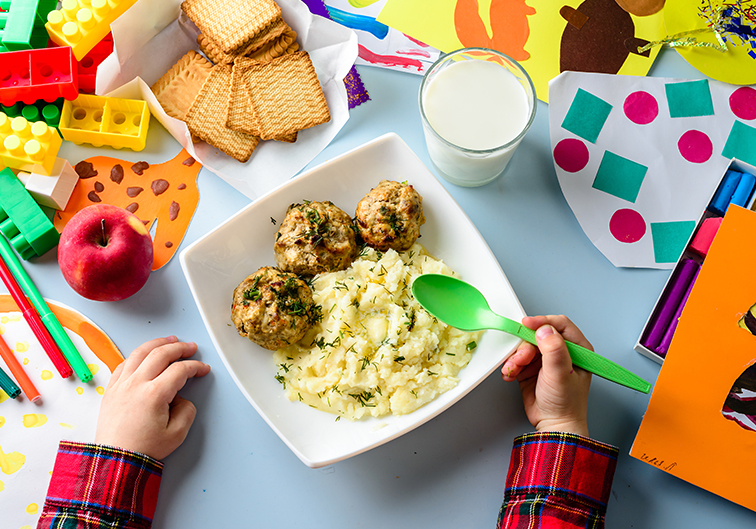25 May
2021
Zydus Healthcare
Is there an ideal meal plan?
All parents want their kids to eat a healthy meal, stay fit, exercise and be engaged. But they get to see or experience never-ending demands for junk food, sedentary lifestyle, extended screen time and inadequate sleep.
Kids will be kids and parents are the one who have to rework on their diet, so they get the nutritious food that is healthy and taste good too. When designing a meal plan for your child, consider the following things:
- Age: Age is an important factor to consider when designing a meal plan for growing children. Toddlers may need mini-meals, while grown-up kids can have three major meals. How much food each meal should have, is the thing that needs to be worked on. For instance, a seven-year-old should have a glass of milk, fruit and cereals for breakfast. While a four years old can have toast and milk as breakfast.
- Weight: If you are designing a meal plan to control your child’s body weight, you may need to be extra careful. Obese kids have more cravings and may feel frustrated when served with a limited portion. If the purpose of designing the meal plan is weight gain, then include food items such as bananas and potatoes that help put up weight.
- Food Preferences: Does your child love to have sweet delights in the breakfast like bread jams, cereals and more. Make sure to consider their food preferences as primary meal planning criteria.
Once you are ready to move ahead in designing your child’s meal plan, you can consider the following healthy options: Each category provides a different nutrition level to the child and every group is mandatory for a growing child.
- Fruits and Vegetables
Fruits and vegetables are the main nutrition for a child. They are rich in vitamins, antioxidants, fibers and water. They help in delivering the basic needs of a human and promote the growth of the body. Nutrition helps a child fight off diseases such as heart strokes, cancer, asthma, etc. Parents should encourage their children to eat fruits and vegetables with every meal. Before eating, one should properly wash them as they might contain dirt, chemicals that are harmful to infants.
- Grain Foods
Grain food contains bread, pasta, cereals, oats, rice, corn, wheat, etc. All these food items are vital for a growing child since they provide carbohydrates and fats to run our body. These are the energy source for cells in our body. Any grain food with a low glycemic index will provide long-lasting energy and keep them feeling fuller for a longer duration.
- Reduced-Fat Dairy Products
Dairy products such as milk, cheese, yogurts are rich in calcium and proteins are essential for strengthening bones. Calcium plays a vital role in the development of muscles, bones and ligaments. Every day a child must consume at least one glass of milk.
- Proteins
Fish, meat, chicken, banana, beans, tofu, nuts are some protein-rich food that must be given to children in daily meals. Proteins run human metabolism and are essential nutrients to consume. These foods also contain iron, zinc, vitamin B12, and other fats. Protein is an energy source for our cells. Therefore, these foods must be consumed regularly.
Additional protein supplementation in toddlers and preschoolers can be done with Complan NutriGro.
A short composition of various foods that a child should include in their meals
- Berries: Rich in Vitamin C, antioxidants, and phytochemicals, strawberries and blueberries to protect the cells from foreign invasions and boost the body’s immunity.
- Eggs: Eggs are rich in proteins; therefore, they should be consumed. They are the richest source of choline that aids in brain development. Either boil, scramble eggs or just make an omelette.
- Peanut Butter: Peanut Butter is rich in mono-unsaturated fats that are a good energy source. One can easily spread it over the bread with salt or sugar or just eat it straight from the jar in whatever ways you like.
- Water: Water is a very vital source of minerals and vitamins. Water contains certain minerals that are specific for food breakdown, and it is an essential diet ingredient for a living organism.
Our body comprises more than 70% water and it is also required to run the metabolism. An infant needs more water to sustain the day. Proper consumption of water prevents dehydration and also excretes out waste from our bodies.
All these food items are important for a child’s growth. If your child doesn’t eat food adequately, then a pediatrician is the best person to whom you can consult. Any eating disorder during an early stage can affect the further growth of a child, and it should be prevented.
